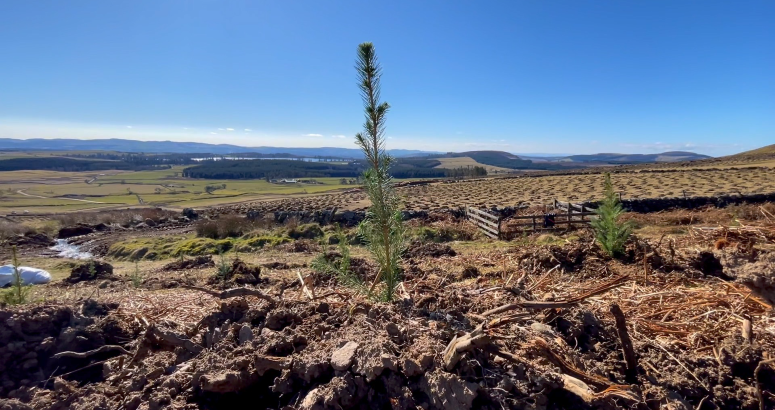Biodiversity boost for Lintrathen land
31 March 2022Creating woodland for biodiversity
Replanting this hillside close to Loch of Lintrathen with a mix of conifers and native trees will improve wildlife habitats and boost biodiversity
“This kind of mixed woodland is a much more attractive place for birds, insects and mammals to live and will massively improve biodiversity in this area.”
Mark Williams, Sustainability and Climate Change Manager, Scottish Water
Scottish Water is creating a brand new area of woodland in Angus aimed at improving biodiversity and wildlife habitats.
The utility company is transforming 100 hectares of hillside close to Lintrathen Reservoir which was previously a mixture of mature conifers and rough grassland. The process of rewilding the site with a combination of native pine and broadleaf trees is underway as part of Scottish Water’s route to net zero. When it matures, the new woodland is expected to be much more beneficial for local wildlife, as well as capturing a significant amount of carbon.
Scottish Water’s Sustainability and Climate Change Manager Mark Williams said: “As part of our overall strategy, we’ve pledged to find opportunities to use the land that we own to increase biodiversity and enhance the natural environment – and that’s exactly what we’re doing here.
“We’ve removed the plantations of conifers currently at this site because they’ve reached the end of their productive lives. They’re being replaced by a mixture of native conifers and broadleaf trees such as ash, oak and birch. This kind of mixed woodland is a much more attractive place for birds, insects and mammals to live and will massively improve biodiversity in this area.
“Not only that, but this new woodland will lock up a huge amount of carbon - we estimate that within about 10 years it will begin to capture around 1000 tonnes of carbon per year, which will be a major contribution towards our net zero goals.”
The logs cut at the Lintrathen site have been sent for processing to James Jones Sawmill in Lockerbie, which also puts sustainability at the heart of its operations. The trees will be used to produce furniture and construction materials.
Stuart McArtney, Forest Manager with Bell Ingram said: “Replanting this land will make a real difference to the wildlife in the area. Dense, monoculture planting provides only a very limited habitat, but this new mixed woodland means we’ll see more birds nesting, insects will come in to pollinate the tree flowers and it could also help to boost the numbers of native species like red squirrels and black grouse.
“These young trees will soon become a fantastic green space for the local community, for wildlife and will make a really important contribution to reducing the effects of climate change.”
Scottish Water is looking for further opportunities to create woodland on its land throughout Scotland, as part of its commitment to reach net zero and improve biodiversity. The utility company has pledged to reach net zero carbon emissions by 2040.








